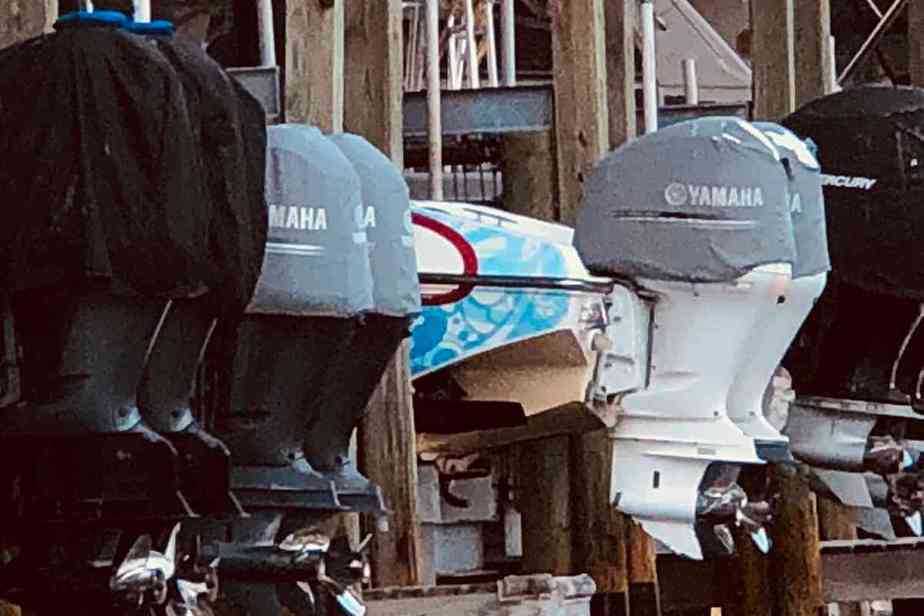How Do You Know If Your Outboard Motor Is Overheating?
As you know, the outboard motor is one of the most important parts of a boat, and that’s why it is very important to take proper care of it. However the outboard motor is a durable part, but there are some factors that can damage it, and one of the most common among them is Overheating. With the increase in temperature, the problem of outboard motor overheating has become very common, and if not treated early, it can cause fatal accidents.
The main thing is that most people don’t realize that their outboard motor is overheated, and due to this, they keep using it in the same condition, which makes the condition even worse.

Table of Contents
- Why Is My Outboard Overheating?
- Outboard Overheating Symptoms
- Basics Of Engine Cooling Systems
- Why Would A Boat Engine Overheat?
- How To Fix Outboard Overheating Problems
- Conclusion
Why Is My Outboard Overheating?
Signs your outboard is overheating are a hot dash gauge, weak engine, slow start, or steam coming from the engine. Outboard overheating is usually caused by a water pump failure, low engine oil, clogged manifolds, a damaged impeller, or thermostat failure.
So if you want to learn about outboard motor overheating, then this article is very beneficial for you. This article will tell you how to identify if your outboard motor is overheating.
Along with this, all the important information regarding overheating will also be mentioned. So if this sounds compelling, then stick to this article. Now without wasting a single minute, let’s get started.
Outboard Overheating Symptoms
Check Dash Gauge
One of the best ways to tell if your outboard motor is overheating is by checking the dash gauge.
You just have to look at the dash gauge for the temperature. If it is green, then you don’t have to worry about anything, but if it goes from green to red, then it is an indication that your boat is overheating.
Weak Engine
The engine is an important part of any vehicle, and it is available in different sizes and power. If you notice that the power of your engine is decreased, then it could result of overheating.
Though if your boat is old, then maybe there could be another reason, but if the boat is not that old, but still the engine lost its efficiency and power, then it is because of overheating.
Takes Time to start
Another common sign that the overboard motor is overheated is that it takes extra time to start up.
Along with this, if your engine does not start up after your shut it off, then it is a clear sign of overheating.
Steam From Exhaust
This is the most obvious sign of overheating. It doesn’t matter what kind of vehicle you have, if you see smoke coming from your exhaust, then it is very clear the vehicle is overheated.
These were the main reasons that caused overheating. Now the main questions that arise is how you can fix these problems.
So if you want to know how to fix the overheating problem, then first, you have to understand the mechanism of boat cleaning systems, then you will be able to understand what causes overheating and how you can fix it.
So let’s talk about the boat engine cooling systems.
Basics Of Engine Cooling Systems
Full Raw Water Systems
Full raw water systems have been used for a longer time, and it is an old engine and is usually present in old boats.
This engine works by sucking the water from the engine to cool it down. When the water of the place you are in goes into the engine cooling passageways, it decreases the heat by heating the water.
And then it drops all the heated water in the lake or river you are in.
Now the main problem that can happen with this type of engine is that along with the water from the lake, other elements such as debris, vegetation, and trash can also come into the engine cooling passageways, which can cause a blockage.
However, there are filters that prevent these elements from coming in, but still, it can cause build-up. So the only recommendation is that you should flush your cooling systems regularly.
Partial Raw Water Systems
This is a new-age outboard engine cooling system, and nowadays, most boats come with it.
In this partial raw water system, the engine is kept in a closed system, and just like the automobiles, it contains antifreeze, which increases the boiling point and prevents the water from freezing.
The main thing that this engine does is that it takes the heated water from the engine to the heat exchanger, which cools the water before sending it back to the engine.
The heat exchanger takes water from the lake to remove the heat and cool down the water in the engine.
So this is a simple process that protects the engine from overheating and any imbalance in this process can cause the engine to overheat.
Why Would A Boat Engine Overheat?
The most common causes of boat engine overheating are water pump failure, low engine oil, clogged manifolds, a damaged impeller, or thermostat failure.
After discussing the fundamental information about cooling systems, it’s time to talk about the things that cause overheating. So here are the most common causes of overheating:
Water Pump Failure
One of the main things that cause overheating is water pump failure. As you know that the cooling system requires raw water to remove the heat from the hot water.
It is very easy to identify that your water pump has failed, you just have to look at the system’s outlet side temperature.
This problem occurs when the supply of fresh water is stopped, which raises the temperature of the inner water.
Apart from this, if the heat exchanger of your boat has defected, then it can also result in water pump failure. However, the problem in the heat exchanger is harder to check, but if your water flows are perfect, then it is the second thing that can cause water pump failure.
Low Engine Oil
If you want to keep your engine healthy and powerful, then you must pay attention to its oiling. Oil is a very important thing to ensure the proper functioning of the engine.
It works as a lubricator, minimizes depreciation, and protects the other important parts. Lack of oil can make the engine weaker, and if you don’t oil it regularly, then due to the excessive friction, the pistons and cylinders will heat up, which is the key factor of all the potential problems.
Clogged Manifolds
Another main cause of overheating is a clog in the manifolds and risers. If the exhaust manifolds and risers get clogged, then it can stop the water flow through the engine.
Though if you are someone who usually travels in saltwater, then the chances of you experiencing this problem are higher, but still, anyone can get it. Along with this, there are different elements, such as rust and corrosion, that get accumulate and blocks the water passages.
The best way to check it is by touching the risers when the engine is on. If you notice that the temperature is high, it indicates that it is clogged.
Damaged Impeller
The water pump impeller also plays a major role in the proper functioning of the engine. This device is responsible for pressuring the water into the bottom of the powerhead.
If the rubber impeller gets damaged or corroded, then it disturbs the flow of water through the pump. Though with time, impellers lose their efficiency, and failure of impellers is very common, that’s why in order to prevent the damage, it is recommended to change the impellers every two years.
Thermostat Failure
A thermostat regulates the temperature of the engine and keeps it at a satisfactory level, which helps the engine to function properly.
However, thermostat failure is not common, but it can be a reason behind overheating. A damaged thermostat won’t be able to maintain the engine temperature, which can reduce the performance and overheat the engine.
How To Fix Outboard Overheating Problems
Check For Blockage
If your boat is overheated, then you should check whether the raw water strainer is plugged or not. Apart from this, make sure there is no blockage in the thru-hulls.
Air It Out
If you have some mechanical skills, then you can also open the engine and let the outer air cool it. However, this is not a permanent fix, but if you are stuck, then it may help you to get out.
Take Professional Help
If you have tried everything but still if the boat is showing the same overheating issue, then it’s time to take professional help.
If any component of the boat is damaged permanently, then there is no way you can fix it. And in that case, calling for a tow is the best thing you should do.
Conclusion
So these are some signs that can help you tell if your outboard motor is overheating.
Many people face this hot boat problem, and it is easy to identify whether your boat is overheated or not. The first thing you should do is check the dash gauge. If it’s red, then there is an overheating problem.
Loss in the power of the engine is also a common cause of overheating.
No matter what the cause is, if your engine is overheating, then you should take proper measures to fix it.
It’s not an issue that should be taken lightly, and if left untreated, it can result in much higher losses. Hope this article will solve some of your queries and give you some valuable information.
